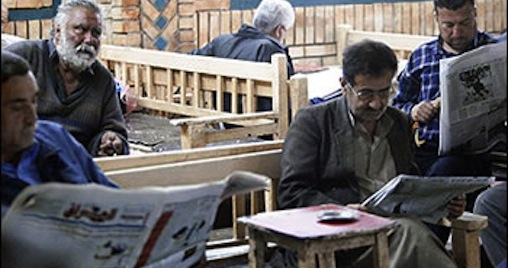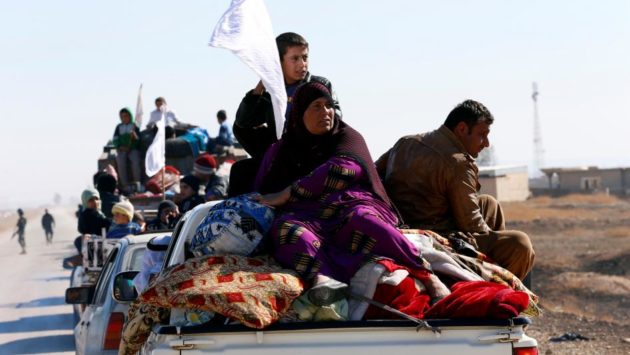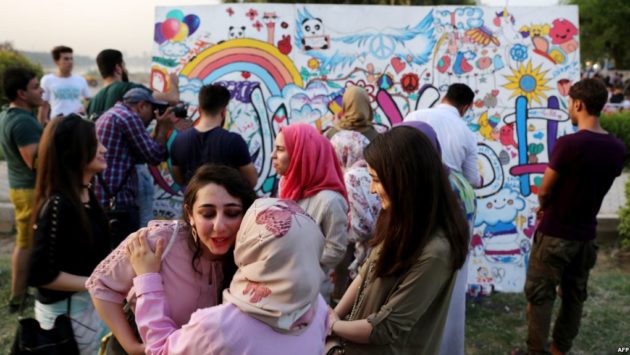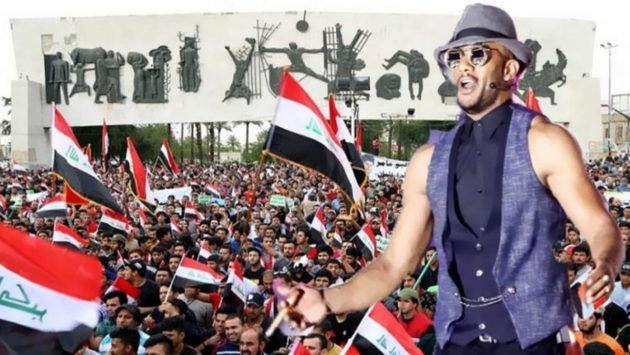Iraq’s Media Cold War: Why Arabs Don’t Understand Kurds, and Vice Versa!
niqash | Mokrayan Kawa | Erbil
Although it has quite possibly never been more important, the potential for conflict and misunderstanding between Iraq’s Arab population and its Kurdish one remains high. Part of the reason for this is the lack of Arabic-language media in Iraqi Kurdistan and the lack of desire on the part of the Kurds to publish or broadcast in Arabic.
In the spring of 2014, Saleh al-Sughayer and his family holidayed in Erbil, capital city of the semi-autonomous northern region of Iraqi Kurdistan. He says that when he arrived he and his wife and children were surprised to find what they thought seemed like a whole other country. They were equally surprised to see the Kurdish flag flying everywhere and to hardly see the Iraqi flag at all – despite the fact that, although Iraqi Kurdistan has its own military, government and judiciary, it is actually still part of Iraq.
Al-Sughayer and his family were not alone. A lot of Iraqi Arabs don’t know much, or enough, about their Iraqi Kurdish cousins in the north. The same may also be said of many Iraqi Kurdish when it comes to Arabs in the south. And all of it might partially be blamed on the media situation in Iraq.
Baghdad doesn’t pay a lot of mind to publishing news about what they do in Kurdish, which is closer to Persian than Arabic. There was a Kurdish language radio station in Baghdad broadcasting in the 1950s but this service faltered when tensions between the Kurdish and Arabs worsened in the 1960s and many of the Kurdish leaders fled into the mountains in northern Iraq.
So often the Iraqi Kurdish population don’t hear much about what’s going on in Baghdad outside of international media, the content of which is translated into Kurdish by Iraqi Kurdish media outlets.
Perhaps because they are the junior partner in the arrangement, the Iraqi Kurdish have been more interested in broadcasting their news in Arabic. The Al Hurriyah radio and television network was set up by one of Iraqi Kurdistan’s two biggest political parties, the PUK, or Patriotic Union of Kurdistan, in Baghdad in 2003 and it is still broadcasting today. The PUK and the region’s other major political party, the KDP, or Kurdistan Democratic Party, also publish two daily newspapers in Arabic.
Still figures gathered by the Kurdistan Journalists’ Syndicate estimate that there are around 1,200 media outlets – including TV, radio and print – in Iraqi Kurdistan. None of them broadcast in Arabic inside Iraqi Kurdistan – and that is even though the number of internally displaced people in the region (many of them Iraqis who speak only Arabic) is now estimated at over 1 million.
Journalists from both Iraqi Kurdish media outlets operating in Arab areas, and the Arab journalists operating in Iraqi Kurdish dominated areas, have it far from easy. Often both groups are treated by locals as though they are foreigners, unwelcome representatives of some interfering alien power.
In 2007, Iraqi Kurdish football fans attacked a TV crew from the Al Jazeera television channel in Dohuk, Iraqi Kurdistan – the channel is funded by the Arab government of Qatar. This was despite the fact that most of the members of the TV crew were actually Kurdish. The attackers said the camera crew were secret agents and that their bosses were racists.
During the same year, young Iraqi Kurdish men attacked the offices of the Al Fayhaa television station which broadcast from one of the Iraqi Kurdish city of Sulaymaniyah’s taller buildings. Although the channel was apparently not doctrinaire in what it broadcast, the attackers justified their actions to police by saying those who ran the channel were racist Arabs.
Similar situations have played out for Iraqi Kurdish journalists. In 2008, offices of the Al Ittihad Arabic-language newspaper, which is run by the PUK, were attacked in southern Iraq after it ran an article that was considered derogatory toward Shiite Muslims. Offices were looted and set alight.
In 2014, the Baghdad offices of the Al Taakhi newspaper, which is run by the Iraqi Kurdish KDP, were attacked and the offices remain closed to this day.
“There are many reasons – and most of them are political – that have made the Kurdish media in this region lose interest in the Arabic language,” Karwan Anwar, the secretary general of the Kurdistan Journalists’ Syndicate, told NIQASH. “And that also applies to Arab media in Iraq and why they lost interest in the Kurdish language.”
“The political relationship between Baghdad and Iraqi Kurdistan has been cold for years,” continues Anwar. “That’s one of the direct reasons. Additionally there is not one single Kurd in management at the official Iraqi media. That’s reflected in the media itself which doesn’t have any desire to make Kurdish one of its broadcast languages.”
“It’s because of how the majority see the minority,” Anwar suggests. “In Iraq, the Arab population is in the majority and they don’t feel like the need to bother with a language that’s only used by a few million people when they themselves number around 25 million.”
Salem Darwish, an Iraqi journalist living in Baghdad, agrees with Anwar – and he is concerned that Baghdad’s messages are not really getting through to the Iraqi Kurdish.
“The country’s Kurdish are an important source of wealth for this country,” Darwish says. “Even Saddam Hussein, for all his cruelty and savagery toward the Kurds, gave them their own media channel. But today Iraq’s Kurds don’t actually know what their government is doing in Baghdad and what it wants. The government and media channels seem to have lost any hope of ever reaching them either – it almost feels like they have given up on the Kurds.”
“The absence of Arab media in Iraqi Kurdistan is really negligent,” Darwish concludes. “The average man on the Arab street sees the Kurdish as enemies. If the Kurdish could establish some influential media they could undo the damage done by the distortion.”





